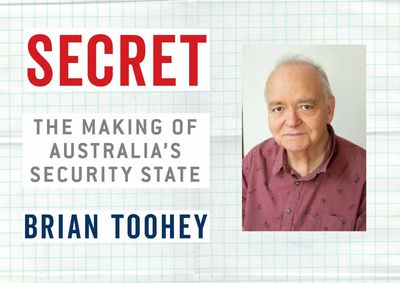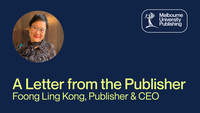Australia's Own National Security State: An excerpt of 'Secret' by Brian Toohey

Elected governments pose the greatest threat to Australians' security. Political leaders increasingly promote secrecy, ignorance and fear to introduce new laws that undermine individual liberties and magnify the risks of being dragged into a horrific new war for no good reason. In Secret Brian Toohey draws on decades of inquiries into national security to examine governing by stealth. Below is an excerpt of Secret, Chapter 43: Australia's Own National Security State.
The fact that the attorney-general of the day has the ultimate discretion about whether to launch a prosecution only adds to the concern.’ - Paul Murphy, CEO of the Media, Entertainment and Arts Alliance
It would be a brave soul who argued that the people of the former Soviet Union gained from the secrecy surrounding its national security agencies. The power of Australia’s national security establishment has grown enormously in recent years, as has its protective wall of secrecy. A succession of new laws is turning Australia into a national security state. Even if parliament moderates a particular bill, the text gives a good guide to what the national security officials will later resurrect.
The Turnbull Coalition government went much further than any predecessor when it introduced two new bills in December 2017—the Espionage and Foreign Interference Bill and the Foreign Influence Transparency Scheme Bill. The first incorporated such a broad definition of espionage that it effectively suppresses public discussion on an unprecedented scale. A joint media organisations submission to the Parliamentary Joint Committee on Intelligence and Security on 22 January 2018 said the bill ‘[would criminalise] all steps of news reporting, from gathering and researching information to publication/communication, and [would apply] criminal risk to journalists, other editorial staff and support staff [who] know of the information that [would now be] an offence to “deal” with, hold and communicate’. The submission quoted the bill as saying it could apply to the release and reception of ‘information of any kind, whether true or false and whether in a material form or not, and includes (a) an opinion; and (b) a report of a conversation’. When the amended bill became law, it retained this catch-all clause. The bill also made it an offence to leak, receive or publish ‘inherently harmful information’ and says that the prosecution does not have to prove it is national security classified information.
Another new offence would be to publish anything that could ‘harm or prejudice relations between the Commonwealth and a state or territory’ or cause a ‘loss of confidence or trust’ in a state or Commonwealth government, however justified the loss of trust. This would potentially criminalise a vast range of media reporting on everyday politics. The espionage bill provided a fifteen-year jail sentence for a new offence of publishing or broadcasting anything for an Australian audience concerning national security that could be available to a ‘foreign principal’ who read, listened to or watched what was reported. As the media has no control over who reads, sees or hears what it produces, this clause covers just about everything it produces. There would be almost no public interest defence. The clause could apply to normal reporting and commentary that exposes stuff-ups by the intelligence services, scandalous behaviour in the defence forces, or the rising cost of weapons acquisitions.
The Law Council of Australia’s submission to the same committee expressed its concern about another clause that would make it a national security offence to cause intangible damage or prejudice to Australia’s international relations, ‘including political, military, and economic relations’. This offence is another that shouldn’t exist in an open society— it could apply to criticism of US trade barriers, Indonesia’s destruction of rainforest, or an arms build-up by China or India.
Not long after the harsh new laws to stop critical media reporting on national security issues were introduced, the then chair of the Parliamentary Joint Committee on Intelligence and Security, Coalition MP Andrew Hastie, made a spirited defence of free speech in February 2019. His unusual behaviour was triggered by a court awarding the Chinese-Australian businessman Chau Chak Wing just under $800,000 including costs in a defamation case after Fairfax Media in 2015 accused him of bribing the president of the UN General assembly. The media group, which is now part of the Nine Network, said it would appeal the court’s finding that it had not established its defence that the article was true. Hastie said he was concerned about the impact of the defamation laws: ‘The ability to report freely and fairly on national security is a vital part of our democracy.’ Never mind that he has been one of the most fervent supporters of new national security laws that provide severe jail sentences for journalists even if they report accurately on reprehensible behaviour by the security agencies. Hastie seemed unconcerned that the court found serious errors in Garnaut’s article. Prime Minister Malcolm Turnbull commissioned Garnaut in 2016 to head a secret ASIO enquiry into Chinese influence in Australia.At the time of writing, the outcome of an appeal is not known and the report remains secret, so it is not possible to assess its overall accuracy.
Amid the proliferation of new offences, it is worth remembering that there has never been a classic espionage operation in which an Australian has divulged military or other governmental secrets of any significance to a foreign intelligence official. Instead of spies on the ground, many espionage attempts these days rely on hacking into computers and databases from offshore locations. Encryption and protection of computer systems, not new laws, should prevent hacking of sensitive government information. In discussing the bill, ministers didn’t explain why espionage is fine when Australian spies do it overseas. Nor did they acknowledge that espionage can help prevent wars by providing information that convinces each side that the other has no aggressive intentions. No Australian politi- cian has ever acknowledged the damage secrecy can cause. President John F. Kennedy, however, admitted he shouldn’t have intervened to prevent the New York Times publishing sensitive details about the imminent invasion of Cuba by CIA-sponsored exiles in April 1961. The failed assault contributed to Cuba’s decision to host Soviet nuclear-armed missiles, almost culminating in a nuclear war with the USSR in 1962. Times executives said Kennedy later told them, ‘If you had printed more about the [CIA] operation, you would have saved us from a colossal mistake.’
Leaks to the Australian media have never killed anyone. The US relies heavily on secret intelligence from Pine Gap in Central Australia to identify targets for bombing in the Middle East or for drone attacks elsewhere, often resulting in the death of civilians. Well-timed leaks about the phoney intelligence on Iraq’s weapons of mass destruction might have prevented the 2003 invasion and its disastrous consequences. Official secrecy repeatedly conceals the killing of innocent people.
Two academic lawyers make a strong case that the ‘lack of formal protection for free speech and other human rights has allowed Australia’s federal parliament to enact many laws in response to terrorism that would be unthinkable in other [democratic] countries’. They also note that the metadata laws requiring telecommunications companies to retain customers’ digital information for two years can expose the identity of sources such as government officials. In late 2017 the government introduced Journalist Information Warrants, which agencies need from an issuing authority comprising lawyers approved by a minister before they access a journalist’s metadata. Journalists can’t contest the validity of a warrant because they are not told about it.
Some journalists find it much easier to toe the official line and stay ‘on the drip’ from ministers and security officials. A low point came when the ABC boasted in late January 2018 that it had received hundreds of highly classified Cabinet documents in a government filing cabinet that had been sold to a second-hand shop. It was an unwelcome gift. The ABC published a small number of bland stories before handing the lot to ASIO, and stressed that it had refused to report anything bearing a national security stamp in case it endangered public safety. Cabinet submissions never contain that sort of detail. If they did, you just don’t report those aspects. In explaining its pathetic behaviour, the ABC implicitly condemned many journalists whose disclosure of highly classified material has served the public interest without hurting national security or any person.
It beggars belief that nothing in the hundreds of classified documents in the filing cabinet, including many below the classification ‘Top Secret’, could have been reported responsibly if the ABC had behaved more like a public broadcaster and less like an East German state broadcaster. A former senior Defence official, Patrick Gourley, said it was a ‘gutless effort’ by the ABC, adding, ‘It is difficult to think of a single instance of a national security leak that has done any great harm.’
Amendments to the espionage and foreign influence bills modified some of the problems before they became law on 28 June 2018. Maximum sentences for some offences were reduced and the attorney-general had to approve some prosecutions—but this is of scant value if the politician holding the office of attorney-general never rejects any request from intelligence officials that could help his or her party.
The Law Council remains unhappy with several clauses. It criticises the continued inclusion of reporting and commentary on ‘economic and political relations with another country’ in the definition of ‘national security offence’. The head of the Media, Entertainment and Arts Alliance, Paul Murphy, said, ‘It took enormous effort by us and other media organisations to get amendments removing some of the [bill’s] worst elements. But the legislation that eventually passed is still quite dangerous. It remains unclear at what point a journalist might cross the line and commit an offence under its provisions.’ He added, ‘The fact that the attorney-general of the day has the ultimate discretion about whether to launch a prosecution only adds to the concern.’ Referring to the approval of bugging Timor-Leste’s Cabinet offices for purposes that harmed that struggling country, Murphy said, ‘The attorney-general Christian Porter’s approval of the prosecution of “Witness K” and his lawyer Bernard Collaery is alarming.’


